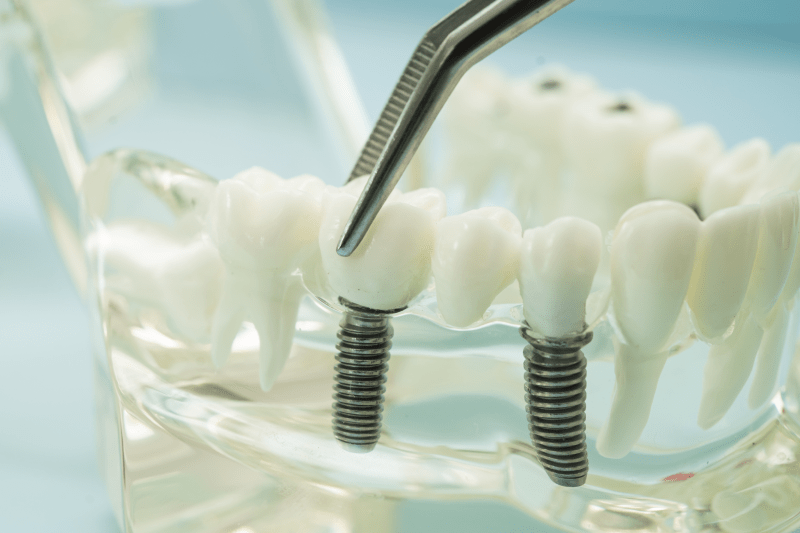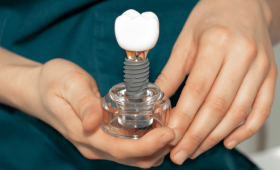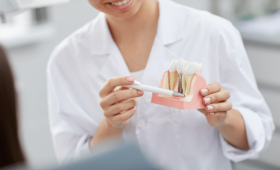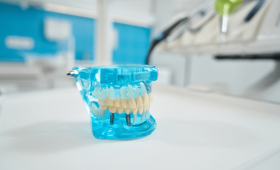What Is The Average Cost Of A Single Dental Implant In Turkey?
The average cost of a single dental implant in Turkey is 60% to 75% lower compared to prices in Western European countries. This cost generally varies depending on the implant brand used (premium, mid-segment, or local), the complexity of the surgical procedure, and the material of the permanent crown (dental veneer) to be applied (zirconium, metal-supported porcelain). This price includes the implant itself, the surgical application, and the healing abutment. This economic advantage makes it possible for patients to budget not only for the operation cost but also for all travel expenses, and thus, patients tend to receive treatment in Turkey.
Why Are Implant Prices So Affordable Compared To European Countries?
The main reasons why implant prices are so affordable in Turkey compared to European countries are the low general operating expenses, personnel and laboratory costs, along with the high value of foreign currencies like the Pound and Euro against the Turkish Lira (exchange rate advantage). High case volume and competition in health tourism allow clinics to reduce their unit costs. Even when international implant brands are used, this economic structure in Turkey makes it possible to offer the same quality and warranty at much more affordable prices.
How Does The Exchange Rate Advantage Reflect On The Patient’s Budget?
The high value of strong foreign currencies like the Euro, Sterling, or Dollar against the Turkish Lira means a significant increase in purchasing power for patients coming from abroad. Surgical and prosthetic services that would cost tens of thousands of Euros in their own countries can be purchased in Turkey with a much lower budget thanks to this exchange rate difference. This economic situation is the most fundamental financial factor that makes it appealing for patients to receive treatment in Turkey because the savings achieved easily cover all travel and accommodation expenses.
Is There A Price Difference Between Premium And Local Implant Brands?
Yes, there is a price difference between international premium implant brands (of Swiss, German, or US origin) and local or mid-segment brands. Premium brands are higher priced due to the lifetime product warranty, advanced biocompatibility technology, and long clinical history they offer. However, thanks to the exchange rate advantage in Turkey, patients can use even premium brands at a cost equivalent to or lower than mid-segment prices abroad. The physician presents different brand options according to the patient’s budget, ensuring the patient makes an informed choice.
Is The All On Four Implant System More Economical Than Classic Implant Treatment?
The All On Four implant system is a more economical and faster solution compared to the traditional 8-10 implant method required for full arch restoration. Since only four implants are used in this system, material and surgical costs decrease. Furthermore, All On Four minimizes or eliminates the need for advanced bone grafting, which is often expensive and time-consuming, by placing implants at an angle in the dense bone regions. This cost and time advantage makes All On Four popular in full mouth implant solutions.
Do Implant Treatment Packages Include Accommodation And Transfers?
Dental health tourism clinics in Turkey and professional institutions like Cure Holiday generally offer “all-inclusive” comprehensive packages for the comfort of patients coming from abroad. These packages cover the surgical cost, as well as VIP airport transfers, accommodation in 4 or 5-star hotels during the treatment period, and post-treatment medication/care kits. This holistic service eliminates the patient’s logistical stress and ensures that the entire travel budget is controlled under a single cost item.
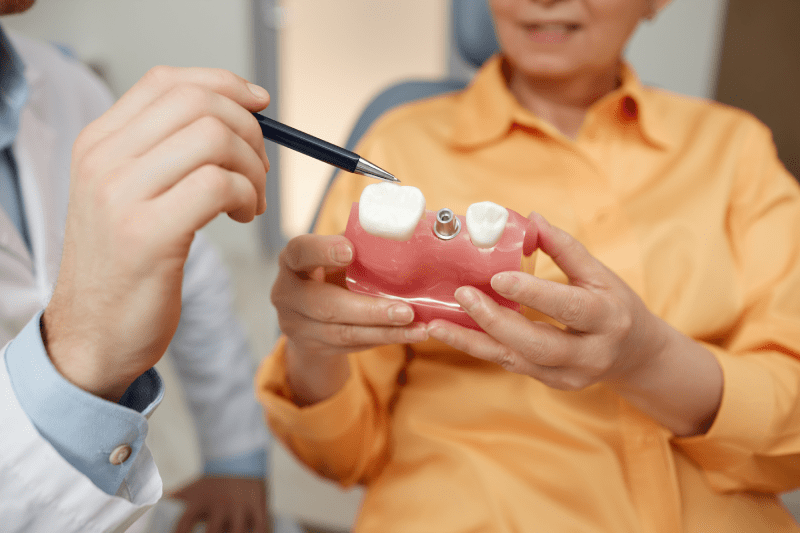
How Does The Material Of The Crown (Dental Veneer) Placed On The Implant Affect The Price?
The material of the permanent teeth (crowns) placed on the implant directly affects the aesthetic quality and total cost of the treatment. Zirconium crowns are the highest-priced option because they provide the closest aesthetic appearance and light transmission to natural teeth. Metal-supported porcelain crowns are more economical. The price varies according to the material of the crown, as well as the digital technology (CAD/CAM) of the laboratory where it is produced. The patient’s budget and aesthetic expectation play a determining role in the choice of crown material.
Is Bone Grafting Or Sinus Lifting Subject To An Extra Fee?
Bone grafting (bone powder) or sinus lifting, which become mandatory for the long-term retention of the implant due to insufficient bone volume, are generally not included in standard implant packages and are reflected as an extra surgical fee on the cost. This additional cost varies according to the amount of graft material used and the complexity of the surgical operation. The physician explains the necessity of these extra steps for the implant to sit on a healthy foundation through detailed tomography analysis, and this cost is expected to be presented transparently.
Is VAT Exemption Applied To Implant Prices?
It is possible to apply Value Added Tax (VAT) exemption to foreign patients coming to Turkey for treatment within the scope of health tourism when legal conditions are met. This situation, especially compared to the high VAT rates in countries like the United Kingdom, further reduces the total amount the patient will pay, providing an additional financial advantage. The clinic’s management of these exemption processes in compliance with the law is important for price transparency.
Is The Total Cost Of All On Four Treatment Close To The Cost Of A Single Dental Implant?
No, the total cost of All On Four treatment is not close to the cost of a single dental implant. Since All On Four covers the restoration of an entire arch (4 implants + prosthesis), it is naturally much higher than the price of a single implant. However, the cost advantage achieved is that the price is significantly lower than the traditional 8-10 implant treatment. All On Four is an ideal solution for patients seeking affordable full mouth restoration.
How Many Times Is Travel To Turkey Required For Implant Treatment?
Since dental implant treatment (single tooth or full mouth) is generally a two-stage process, patients must plan two separate trips to Turkey. First trip (3-7 days): Implant surgery and placement of temporary teeth. Second trip (3-6 months later, 5-8 days): Placement of permanent crowns/prostheses after the implants have fused with the bone. This two-stage process is mandatory for the implant to be long-lasting and biologically successful.
How Long Does It Take For Implants To Fuse With The Jawbone?
The process of the implants fusing healthily with the jawbone (Osseointegration) takes an average of 3 to 6 months, depending on the patient’s bone quality and general health status. This waiting period is critical for the implants to become strong enough to bear the chewing load of the permanent prostheses. The physician proceeds to the second stage (permanent prosthesis) only after confirming sufficient fusion with tomography at the end of this period; this biological process can never be accelerated.
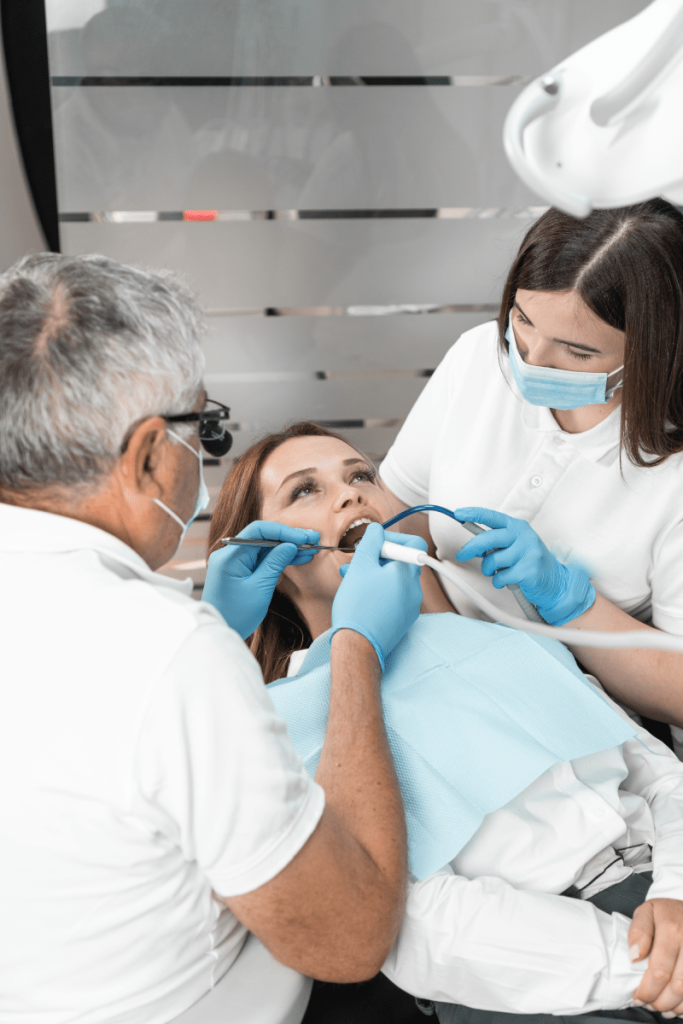
Are Temporary Teeth Used During The Treatment Process And Are They Included In The Fee?
Yes, temporary teeth or prostheses are definitely used in implant treatment for the patient’s aesthetic and social life comfort. The cost of these temporary solutions is generally included in the implant package price and no extra fee is charged. Temporary teeth enable the patient to pass the implant fusion period (3-6 months) comfortably and maintain their aesthetic appearance until the permanent prostheses are placed. It is critical that the patient adheres to the physician’s instructions (avoiding hard foods) when using these temporary teeth.
Is Pain Or Discomfort Felt During Implant Surgery?
Since implant surgery is performed mostly under local anesthesia by expert surgeons, the patient absolutely does not feel any pain or ache during the operation. The mild sensitivity and swelling that may be felt after the surgery are easily controlled with the strong painkillers and antibiotics prescribed by the physician. The option of sedation (conscious sleep) can also be offered for long and complex surgeries to maximize patient comfort, subject to an extra fee.
Is There An Age Limit For Implant Treatment?
There is no upper age limit for dental implant treatment; anyone whose general health condition is suitable for surgery can undergo treatment. However, since the jawbone development must be completed for implant placement, the lower age limit is generally accepted as 18. In elderly patients, having chronic diseases under control and a low bleeding risk are the most important factors for the success of the treatment.
What Is The Experience Level Of Physicians In Istanbul And Other Major Cities?
Since Turkey’s major cities (Istanbul, Izmir, Antalya) are centers of health tourism, implantology specialists have very high case experience at an international level. Turkish surgeons successfully treat a much higher number and variety of complex cases (bone deficiency, those requiring sinus lifting) compared to their colleagues abroad. This high practical experience minimizes surgical risks and is the most important quality guarantee that maximizes the implant treatment success rate.
Which International Accreditations Indicate The Reliability Of The Clinic?
When choosing a reliable clinic for implant treatment, JCI (Joint Commission International) accreditation and the T.R. Ministry of Health’s Health Tourism Authorization Certificate should be sought. JCI indicates that the clinic meets the highest global standards in sterilization, patient safety protocols, and treatment quality. These accreditations are the most concrete evidence of the clinic’s medical quality and reliability for patients coming from abroad and guarantee that patients receive treatment in Turkey.
How Is The Aesthetic Appearance Of Implant Prostheses (Crowns) Determined?
The color and shape of the implant crowns are determined under the supervision of the physician, considering Digital Smile Design (DSD) analyses, the patient’s face shape, skin tone, and personal expectations. Aesthetic materials like Zirconium are used to achieve the closest light transmission to natural teeth. Expert aesthetic dentists in Istanbul and Izmir work with millimetric precision to ensure the prosthesis perfectly harmonizes with the lip line and facial structure.

What Is The Warranty Period Of The Implant Prosthesis (Crown)?
A clinic warranty ranging generally between 5 and 10 years is offered for the permanent prostheses (crowns) placed on the implant. This warranty covers clinical issues such as material defects, cracking, or non-fit and commits the clinic to free repair or replacement in these situations. A lifetime product warranty is generally offered for the implants themselves, depending on the brand.
Which Medical Tests And Scans Are Mandatory Before Treatment?
Before starting implant treatment, detailed medical tests and scans are mandatory to determine the patient’s general health status and surgical risks. These usually include panoramic X-rays, 3D dental tomography (CBCT), standard blood tests showing bleeding/clotting times, and diabetes (HbA1c) checks. The fees for these tests are generally included in the package price by reliable clinics.
Is The Second Surgery Charged In Case The Implant Does Not Fuse?
In the event of an unexpected implant loss (failure to fuse with the bone), if this situation is due to a clinic or material error and is within the warranty period, the clinic generally covers the second surgery and new implant free of charge. This demonstrates the clinic’s confidence in its quality. However, if the implant loss is due to the patient’s own negligence (smoking, poor hygiene), the warranty may be void, and the patient may have to cover the extra cost.
What Is The Lifespan And Durability Of Implant Treatment?
In dental implant treatment correctly applied by experts according to international standards, the implants themselves are designed and accepted to be durable for a lifetime. The lifespan of the permanent prostheses (crowns) placed over the implants, however, varies between 10 and 20 years. The longevity of the prostheses depends on the patient’s meticulous adherence to regular hygiene and 6-month check-up appointments.
Are Long-Term Follow-Up Appointments Charged After Implant Treatment?
To ensure the longevity of the implants, reliable clinics generally offer periodic follow-up appointments free of charge for 1 year after the treatment. These check-ups are vital for monitoring the health of the bone and gum around the implants. Patients are only obligated to cover their travel expenses (airfare) for these controls. Regular check-up adherence is mandatory for the continuity of the warranty.
How Does Smoking And Alcohol Consumption Affect Implant Success?
Smoking and alcohol consumption are the biggest risk factors that seriously reduce the success rate of implant treatment. Nicotine inhibits the blood flow and oxygen flow vital for the implant to fuse with the bone. Therefore, physicians strictly require patients to absolutely refrain from these substances for at least one month before and after the operation. Failure to comply with this rule increases the risk of implant loss and can violate the warranty conditions.
Is Special Equipment Required For Cleaning Implant-Supported Prostheses?
Yes, cleaning implant-supported prostheses requires special attention and equipment to preserve the health of the gum tissue around the implant. In addition to a regular toothbrush, patients must use special super floss, interdental brushes, and water flossers to clean underneath the prosthesis and around the implant. The cost of these special care products is not included in the package, but their regular use is mandatory to maximize the implant’s lifespan.
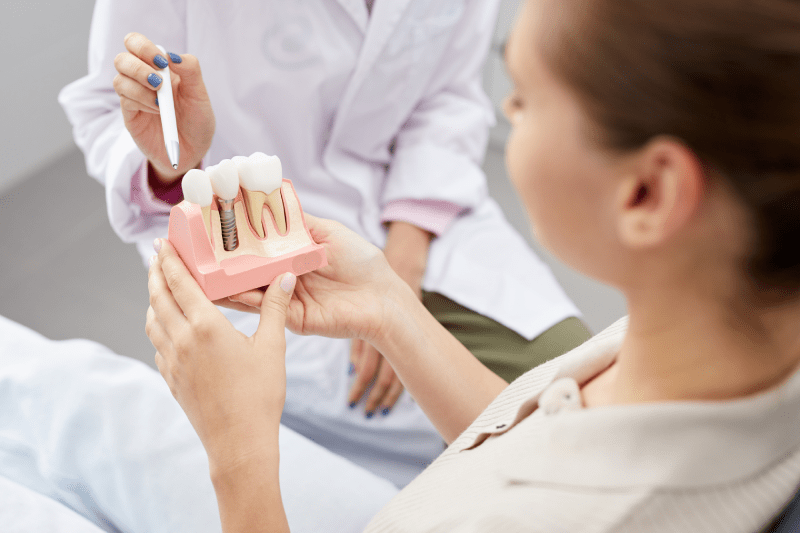
How Long Do Swelling And Pain Last After Implant Treatment?
Swelling (edema) after implant surgery generally peaks within 24-48 hours post-operation and substantially reduces within 5 to 7 days. Pain is easily controlled with prescribed medications and disappears within 3-4 days. Intermittent ice application during the first 48 hours and resting in the position recommended by the physician are important steps that accelerate the healing process.
How Does Physician Specialization Affect The Implant Price?
The success of implant surgery depends on the physician’s specialization in areas such as Oral and Maxillofacial Surgery. The service fee of a specialist physician may be slightly higher than that of general dentists. However, this difference is considered a necessary cost due to the long-term success guarantee provided by the minimization of surgical risks and the correct positioning of the implant, even in complex cases. In Turkey, specialist physicians combine this quality difference with affordable prices.
Can The Implant Treatment Process Be Combined With A Holiday?
Yes, combining implant treatment with a holiday in Turkey is one of the biggest advantages. Especially after the first surgical stage, although a short recovery period is required, patients can visit historical and touristic sites during their stay in cities like Istanbul, Antalya, or Izmir. The second trip (placement of permanent prostheses) can be spent entirely in the comfort of a holiday. Transfers and accommodation included in the packages make this experience stress-free.
Is The Treatment Of Gum Diseases Mandatory Before Implant Treatment?
Yes, for the long-term success of the implant treatment, the complete treatment of all gum diseases (Periodontitis) in the mouth is absolutely mandatory. Gum inflammation can infect the bone surrounding the implant, leading to implant loss. Therefore, physicians mandate necessary gum treatments (deep cleaning, curettage) before implant placement, and the cost of these treatments is usually added separately to the implant package.
How Is The Originality Of Materials Used In Implant Treatment Controlled?
The originality of the implant brand and material is checked by the internationally valid brand certificates and serial-numbered warranty cards given to the patient at the end of the treatment. These documents prove the implant’s origin (Switzerland/Germany, etc.) and quality transparently. Reliable clinics are obligated to present these documents upon the patient’s request, ensuring the long-term reliability of the investment.
How Does The Warranty Work In Case Of Crown Breakage After Treatment?
In case of crown (prosthesis) breakage or cracking, if the problem is due to a material defect, laboratory, or clinic error and is within the warranty period, the clinic provides free repair or replacement. However, if the breakage is due to the patient’s own negligence (biting hard objects, trauma), the warranty may be void, and the patient covers the extra cost. Contract details are crucial in this regard.
Which Chronic Diseases Are Obstacles To Implant Treatment?
Chronic diseases that pose a risk or obstacle to implant treatment include uncontrolled advanced diabetes, immune system weakening diseases, severe osteoporosis, and uncontrolled use of blood thinners. Controlling these chronic diseases and obtaining the physician’s approval are mandatory for the implant treatment to be performed safely.
Are Accommodation And Transfer Fees Included In The Second Trip Package?
Yes, in most comprehensive implant packages, the necessary accommodation and VIP transfer services for the second trip (placement of permanent prostheses) after the implants have fused with the bone are also included in the price. This ensures that the patient spends their second stay comfortably and efficiently, and helps manage all logistical costs from the beginning.
Is Digital Planning (Tomography) Used In Treatment Included In The Fee?
In modern implant clinics, the fees for 3D dental tomography (CBCT) scanning and digital planning (Surgical Template) services, which are mandatory for placing the implants at the most accurate angle, are generally included in the comprehensive package price. The inclusion of these technologies in the price shows the clinic’s investment in advanced technology and its commitment to transparent treatment planning.
Is It Mandatory To Return To Turkey For Repeat Check-Ups?
To guarantee the longevity of the implants and prostheses, physicians generally recommend a check-up visit 6 months or 1 year after the treatment. This control is not mandatory but is strongly advised for the warranty to remain valid. Clinics offer these controls free of charge; the patient only covers the travel expenses. Cure Holiday assists patients in coordinating these controls.
How Is The Language Barrier Overcome During The Implant Treatment Process?
Health tourism-focused clinics in Turkey employ fluent English-speaking coordinators, translators, and healthcare personnel for the comfort of patients coming from abroad. Patients working with Cure Holiday receive uninterrupted translation support from the first contact to the final check-up. This ensures that the patient fully understands medical instructions and that the treatment process proceeds safely.

Which Turkish Cities Are Most Preferred For Implant Treatment?
The Turkish cities most preferred for implant treatment are Istanbul, Izmir, and Antalya. Istanbul stands out with its widest range of specialist physicians and high technological infrastructure. Antalya and Izmir, on the other hand, are ideal centers that allow patients to combine high-quality clinic services with holiday and rest opportunities. All these cities are advantageous in terms of English-speaking staff and logistical ease.
Is Implant Treatment Possible For Patients With Bone Loss?
Yes, implant treatment is possible even for patients with advanced bone loss. In these cases, special techniques such as All On Four/Six implant systems are used, or supplementary surgical procedures such as bone grafting/sinus lifting are applied to create sufficient bone volume. The experience of the surgeon and the selection of the correct technique ensure high success rates even in such challenging cases.
What Should Be Done To Have A Single Implant Loss Covered By The Warranty?
In the event of an unexpected implant loss, for it to be covered by the warranty, the patient must provide medical records proving that the loss was caused by a physician or material error and apply within the warranty period. Most importantly, the patient must not have violated the contract terms regarding smoking prohibition, hygiene rules, and control appointments that may lead to implant loss.
